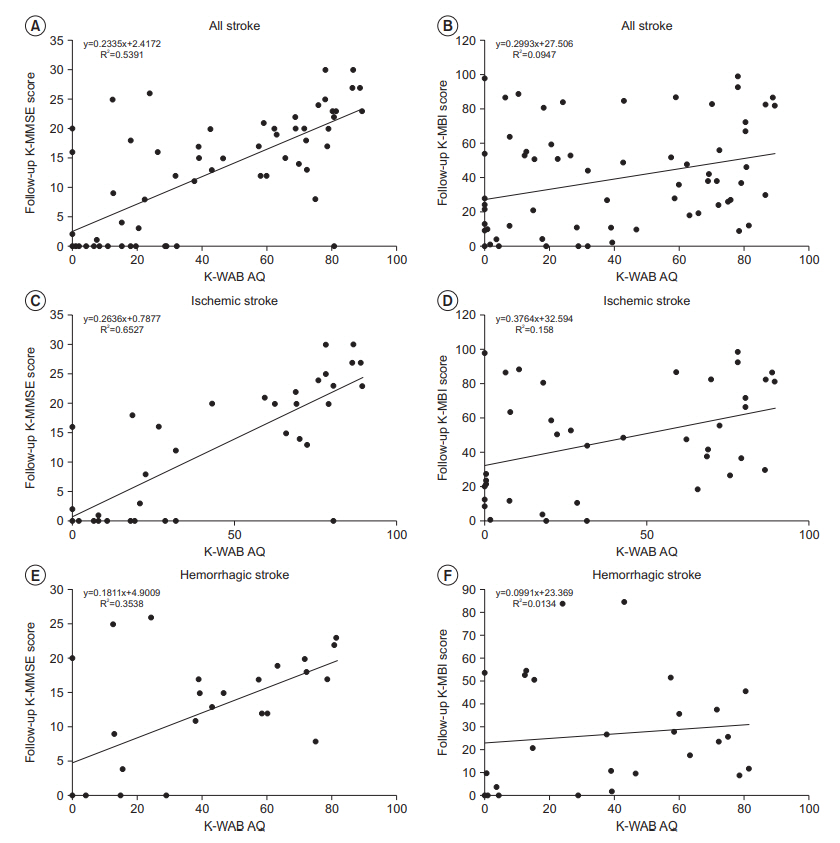Ann Rehabil Med.
2020 Jun;44(3):171-180. 10.5535/arm.19096.
Post-stroke Aphasia as a Prognostic Factor for Cognitive and Functional Changes in Patients With Stroke: Ischemic Versus Hemorrhagic
- Affiliations
-
- 1Department of Rehabilitation Medicine, Dankook University College of Medicine, Cheonan, Korea
- 2Department of Nanobiomedical Science & BK21 PLUS NBM Global Research Center for Regenerative Medicine, Dankook University, Cheonan, Korea
- 3Institute of Tissue Regeneration Engineering (ITREN), Dankook University, Cheonan, Korea
- KMID: 2504437
- DOI: http://doi.org/10.5535/arm.19096
Abstract
Objective
To investigate the comprehensive outcomes in aphasic patients, including their cognitive and functional status after ischemic or hemorrhagic stroke. It also aimed to clarify whether aphasia is a prognostic factor for cognitive and functional improvements in stroke patients.
Methods
Sixty-seven ischemic or hemorrhagic stroke patients in the subacute stage who had been diagnosed with aphasia using the Korean version of Frenchay Aphasia Screening Test (K-FAST) were included in the study. Forty-six stroke patients without aphasia were used as controls. All patients were examined with the Korean version of the Western Aphasia Battery (K-WAB). Cognitive and functional assessments of the patients including the Korean version of Mini-Mental State Examination (K-MMSE), and the Korean version of Modified Barthel Index (K-MBI) were performed during admission and 4 weeks after the initial assessments.
Results
The initial and follow-up total K-MMSE and K-MBI scores were significantly lower in aphasic patients than in non-aphasic controls. The K-WAB scores highly correlated with the total K-MMSE scores at the follow-up stage in all aphasic stroke patients. The K-WAB scores moderately correlated with the follow-up scores of the K-MBI in ischemic stroke patients but not in hemorrhagic stroke patients.
Conclusion
Aphasia influences the cognitive and functional status of stroke patients and has a greater impact on cognitive improvement. Aphasia severity can be one of the prognostic factors for cognitive status in aphasic patients with stroke.
Keyword
Figure
Reference
-
1. Watila MM, Balarabe SA. Factors predicting poststroke aphasia recovery. J Neurol Sci. 2015; 352:12–8.2. Boehme AK, Martin-Schild S, Marshall RS, Lazar RM. Effect of aphasia on acute stroke outcomes. Neurology. 2016; 87:2348–54.
Article3. Plowman E, Hentz B, Ellis C Jr. Post-stroke aphasia prognosis: a review of patient-related and strokerelated factors. J Eval Clin Pract. 2012; 18:689–94.
Article4. Gialanella B. Aphasia assessment and functional outcome prediction in patients with aphasia after stroke. J Neurol. 2011; 258:343–9.
Article5. Fonseca J, Ferreira JJ, Martins IP. Cognitive performance in aphasia due to stroke: a systematic review. Int J Disabil Hum Dev. 2017; 16:127–39.
Article6. Andersen KK, Olsen TS, Dehlendorff C, Kammersgaard LP. Hemorrhagic and ischemic strokes compared: stroke severity, mortality, and risk factors. Stroke. 2009; 40:2068–72.7. Paolucci S, Antonucci G, Grasso MG, Bragoni M, Coiro P, De Angelis D, et al. Functional outcome of ischemic and hemorrhagic stroke patients after inpatient rehabilitation: a matched comparison. Stroke. 2003; 34:2861–5.8. Bhalla A, Wang Y, Rudd A, Wolfe CD. Differences in outcome and predictors between ischemic and intracerebral hemorrhage: the South London Stroke Register. Stroke. 2013; 44:2174–81.
Article9. Tsai CF, Jeng JS, Anderson N, Sudlow CL. Comparisons of risk factors for intracerebral hemorrhage versus ischemic stroke in Chinese patients. Neuroepidemiology. 2017; 48:72–8.
Article10. Croquelois A, Bogousslavsky J. Stroke aphasia: 1,500 consecutive cases. Cerebrovasc Dis. 2011; 31:392–9.
Article11. Klebic J, Salihovic N, Softic R, Salihovic D. Aphasia disorders outcome after stroke. Med Arh. 2011; 65:283–6.
Article12. Ha JW, Pyun SB, Lee HY, Hwang YM, Nam K. Reliability and validity analyses of the Korean version of Frenchay Aphasia Screening Test in brain-damaged patients. Commun Sci Disord. 2019; 14:46–57.13. Thiel A, Zumbansen A. The pathophysiology of poststroke aphasia: a network approach. Restor Neurol Neurosci. 2016; 34:507–18.
Article14. Tsouli S, Kyritsis AP, Tsagalis G, Virvidaki E, Vemmos KN. Significance of aphasia after first-ever acute stroke: impact on early and late outcomes. Neuroepidemiology. 2009; 33:96–102.
Article15. Dickey L, Kagan A, Lindsay MP, Fang J, Rowland A, Black S. Incidence and profile of inpatient strokeinduced aphasia in Ontario, Canada. Arch Phys Med Rehabil. 2010; 91:196–202.
Article16. Gialanella B, Bertolinelli M, Lissi M, Prometti P. Predicting outcome after stroke: the role of aphasia. Disabil Rehabil. 2011; 33:122–9.
Article17. Chiu D, Peterson L, Elkind MS, Rosand J, Gerber LM, Silverstein M, et al. Comparison of outcomes after intracerebral hemorrhage and ischemic stroke. J Stroke Cerebrovasc Dis. 2010; 19:225–9.
Article18. Quinn TJ, Langhorne P, Stott DJ. Barthel index for stroke trials: development, properties, and application. Stroke. 2011; 42:1146–51.19. Hsueh IP, Lin JH, Jeng JS, Hsieh CL. Comparison of the psychometric characteristics of the functional independence measure, 5 item Barthel index, and 10 item Barthel index in patients with stroke. J Neurol Neurosurg Psychiatry. 2002; 73:188–90.
Article20. Barnay JL, Wauquiez G, Bonnin-Koang HY, Anquetil C, Perennou D, Piscicelli C, et al. Feasibility of the cognitive assessment scale for stroke patients (CASP) vs. MMSE and MoCA in aphasic left hemispheric stroke patients. Ann Phys Rehabil Med. 2014; 57:422–35.
Article21. Helm-Estabrooks N. Cognition and aphasia: a discussion and a study. J Commun Disord. 2002; 35:171–86.
Article
- Full Text Links
- Actions
-
Cited
- CITED
-
- Close
- Share
- Similar articles
-
- Characteristics of Cognitive Impairment in Patients With Post-stroke Aphasia
- Simultaneous Onset of Ischemic and Hemorrhagic Stroke Due To Intracranial Artery Dissection
- Prolonged Ictal Aphasia Presenting as Clinical-Diffusion Mismatch in a Patient with Acute Ischemic Stroke
- The Migraine-Stroke Connection
- Cerebrovascular Disease : Overview and Classification



